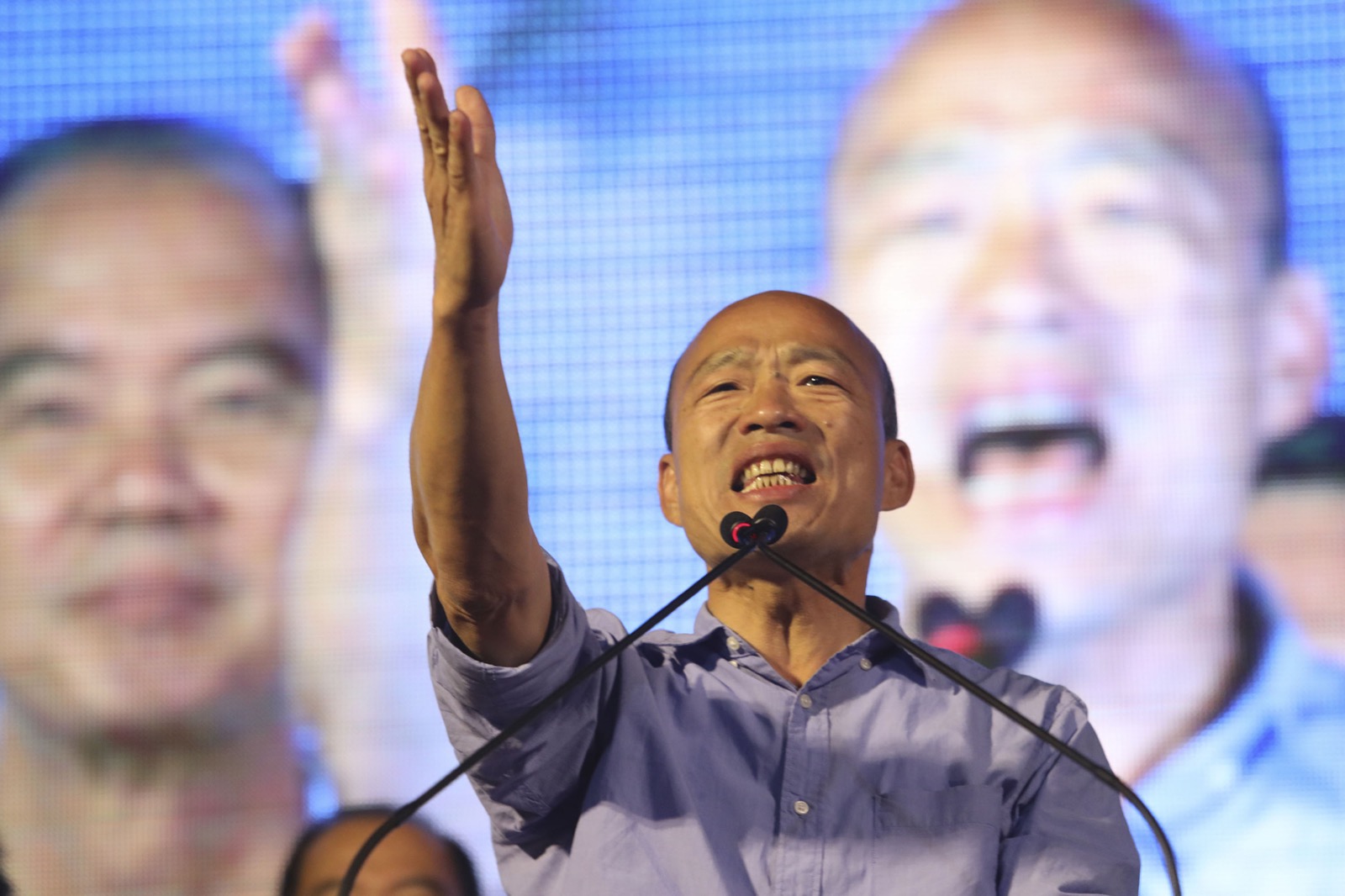Han Kuo-yu, a Beijing-friendly populist, might still win Taiwan 2020

Opinion polls tip Taiwan President Tsai Ing-wen (蔡英文 Cài Yīngwén) to win a second term in office in large part because of her tough stance on China, to the point of backing anti-Beijing demonstrations in Hong Kong. Han Kuo-yu (韩国瑜 Hán Guóyú), her chief opponent in the forthcoming January 11 election, embraces closer relations with Beijing, including a resumption of formal talks that China severed under Tsai. Could he possibly win?
Han hit a public opinion stride last year when he won the mayoral race in a southern city where voters normally prefer Tsai’s Democratic Progressive Party party. His populist, get-things-done appeal — accentuated by a shiny bald head and blue work shirts with sleeves rolled up to the elbows — gave him street creds. He won the Nationalist Party’s presidential nomination in July.
But his willingness to engage China as Hong Kong protesters keep clashing with police stands to hurt him, political scholars say. China hopes someday to rule Taiwan as it governs Hong Kong now. Tsai was leading by 49 percent to 40 percent as of November 4, coming back from 44 percent to Han’s 48 percent in July, Taiwan’s TVBS News found in a poll.
Han gave a media briefing last Thursday — the first one with foreign media in Taiwan — in which he spoke extensively about China. Here are four takeaways — and how his comments might help him in the upcominig elections.
1. Support the “1992 Consensus”
This is China’s chief condition to get along with Taiwan on any level. The consensus refers to an informal understanding that each side will call itself “China,” subject to different ideas about what the term means. For Taiwan, it would mean the government’s constitutional name Republic of China. Beijing sees it as the People’s Republic of China.
Beijing rejects the term “Taiwan” as a replacement because it implies separation from China rather than a move toward its goal of unification. The two sides have been ruled separately since the Republic of China lost the Chinese Civil War and retreated to Taiwan in December 1949.
When former president Ma Ying-jeou (马英九 Mǎ Yīngjiǔ) ruled from 2008 to 2016, his government’s recognition of the “consensus” spawned 23 deals with Beijing. Those agreements let in millions of Chinese tourists to Taiwan, hatched the first direct flights, and dropped trade tariffs. China also quit tempting Taiwan’s diplomatic allies to switch allegiance.
Tsai, backed by a party with senior members that advocate a constitutional separation from China, rejects the consensus. But she has come under fire since her 2016 inauguration for not producing an alternative. Without one, Taiwan misses out on new agreements with China, keeper of the world’s No. 2 economy. “Han Kuo-yu for sure wants to bring these two sides closer,” said Liu Yih-jiun, public affairs professor at Fo Guang University in Taiwan. “Tsai Ing-wen’s government turns out to be the opposite.”
2. Continue formal talks with China
Han would direct his government to start a formal dialogue with China. “If I’m elected president, I’m confident I can open a dialogue with mainland China,” Han told a news conference on Thursday. “It’s now in a state of being stopped and that status is bad for Taiwan. Even during the Cold War period, there were hotlines that were open.”
Beijing quit earlier talks in mid-2016 because Tsai rejected the consensus.
Some Taiwanese say they want talks on more economic deals. They may also see dialogue as a way to avoid the violent anti-government protests and counter-protests gripping Hong Kong, said Joanna Lei, chief executive officer of the Chunghua 21st Century Think Tank in Taiwan. “The way Hong Kong deteriorates makes people think the best way to avoid that happening here is not have the cancer,” she said.
3. Resist “one country, two systems” as proposed by China vis-a-vis Taiwan
An idea floated by Chinese President Xi Jinping in January implied that the Chinese Communist Party would rule Taiwan as it rules Hong Kong today: Beijing would be in charge but extend certain measures of autonomy.
“We have a complete constitutional system, a complete taxation scheme, and complete national defense as well as a free democratic lifestyle and total free democratic attitude,” Han said at the media event. “We can’t give that up.”
More than 80 percent of Taiwanese said in government surveys in January and March that they prefer autonomy over unification. Han, like other Nationalist leaders, could talk with Beijing without agreeing to “one country, two systems,” Lei said. “The Nationalists have a very long history of negotiating without caving, like the two Koreas.”
4. No peace deal with China
Han said he would not sign a peace deal with China as long as it’s deploying weapons that could hit Taiwan. Neither side “wins” if one uses force, he told the news conference. This idea may give Han safety from being seen among voters as too eager to please Beijing. There is also no public outcry in Taiwan favoring a peace accord.





